现代大学英语口语2Unit2
- 格式:ppt
- 大小:2.27 MB
- 文档页数:22
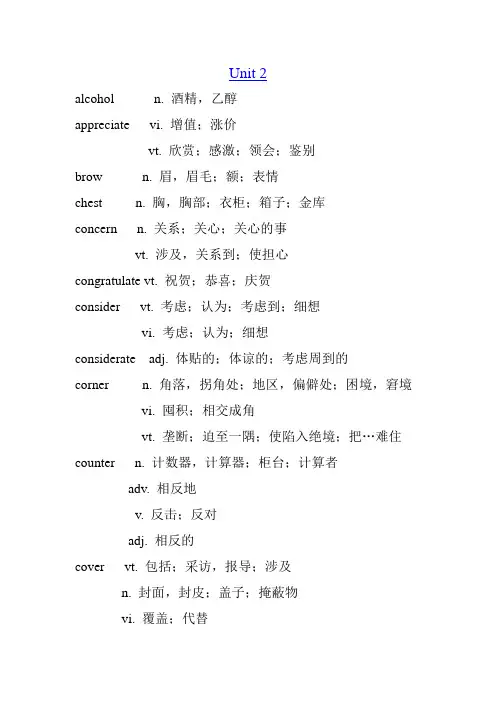
Unit 2alcohol n. 酒精,乙醇appreciate vi. 增值;涨价vt. 欣赏;感激;领会;鉴别brow n. 眉,眉毛;额;表情chest n. 胸,胸部;衣柜;箱子;金库concern n. 关系;关心;关心的事vt. 涉及,关系到;使担心congratulate vt. 祝贺;恭喜;庆贺consider vt. 考虑;认为;考虑到;细想vi. 考虑;认为;细想considerate adj. 体贴的;体谅的;考虑周到的corner n. 角落,拐角处;地区,偏僻处;困境,窘境vi. 囤积;相交成角vt. 垄断;迫至一隅;使陷入绝境;把…难住counter n. 计数器,计算器;柜台;计算者adv. 相反地v. 反击;反对adj. 相反的cover vt. 包括;采访,报导;涉及n. 封面,封皮;盖子;掩蔽物vi. 覆盖;代替dab n. 轻拍;少量;熟手;比目鱼v. 轻拍;涂;轻擦;轻敷debate vt. 辩论,争论,讨论vi. 辩论,争论,讨论n. 辩论;辩论会demonstrate vt. 证明;展示;论证vi. 示威drain vi. 排水;流干vt. 喝光,耗尽;使流出;排掉水n. 排水;下水道,排水管;消耗gesture n. 姿态;手势vi. 作手势;用动作示意vt. 用动作表示greasy adj. 油腻的;含脂肪多的;谄媚的hypocritical adj. 虚伪的;伪善的imply vt. 意味;暗示;隐含indifference n. 漠不关心;冷淡;不重视;中立mop vt. 擦干;用拖把拖洗vi. 用拖把擦洗地板;扮鬼脸n. 拖把;蓬松的头发;鬼脸nozzle n. 喷嘴;管口;鼻overhear vt. 无意中听到;偷听vi. 无意中听到;偷听到pile n. 堆;大量;建筑群vt. 累积;打桩于vi. 挤;堆积;积累pinch vt. 捏;勒索;使苦恼;掐掉某物,修剪n. 匮乏;少量;夹痛vi. 夹痛;节省pitch vi. 倾斜;投掷;搭帐篷;坠落vt. 投;掷;定位于;用沥青涂;扎营;向前倾跌n. 沥青;音高;程度;树脂;倾斜;投掷;球场pound n. 英镑;重击,重击声;兽栏;拘留所vt. 捣烂;敲打;监禁,拘留vi. 连续重击,猛击press vt. 压;按;逼迫;紧抱vi. 压;逼;重压n. 压;按;新闻;出版社;[印刷] 印刷机racist n. 种族主义者;种族主义的rate n. 比率,率;速度;价格;等级vt. 认为;估价;责骂vi. 责骂;被评价refrigerator n. 冰箱,冷藏库relax vi. 放松,休息;松懈,松弛;变从容;休养vt. 放松;使休息;使松弛;缓和;使松懈rinse vt. 漱;冲洗掉;漂净n. 冲洗;漂洗;[轻] 染发剂;染发vi. 冲洗掉;漂净rummage vt. 检查;搜出;仔细搜查;翻找出n. 翻找;检查;查出的物件;零星杂物vi. 翻找;仔细搜查sake n. 目的;利益;理由;日本米酒silverware n. 银器;镀银餐具sink vi. 下沉;消沉;渗透vt. 使下沉;挖掘;使低落n. 水槽;洗涤槽;污水坑snap vt. 突然折断,拉断;猛咬;啪地关上vi. 咬;厉声说;咯嗒一声关上n. 猛咬;劈啪声;突然折断adj. 突然的spray n. 喷雾;喷雾器;水沫vt. 喷射vi. 喷squeeze vt. 挤;紧握;勒索vi. 压榨n. 压榨;紧握;拥挤;佣金statistics n. 统计;统计学;[统计] 统计资料surface n. 表面;表层;外观adj. 表面的,肤浅的vi. 浮出水面vt. 使浮出水面;使成平面terrific adj. 极好的;极其的,非常的;可怕的thoroughly adv. 彻底地,完全地tighten vt. 变紧;使变紧vi. 绷紧;变紧unattached adj. 独立的;未订婚的;未被查封的;未任命的wrist n. 手腕;腕关节vt. 用腕力移动。
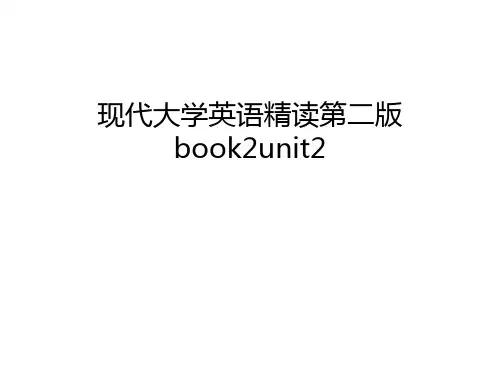
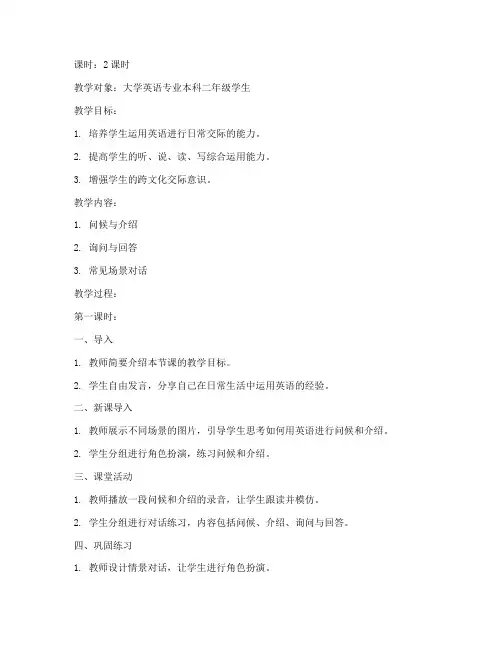
课时:2课时教学对象:大学英语专业本科二年级学生教学目标:1. 培养学生运用英语进行日常交际的能力。
2. 提高学生的听、说、读、写综合运用能力。
3. 增强学生的跨文化交际意识。
教学内容:1. 问候与介绍2. 询问与回答3. 常见场景对话教学过程:第一课时:一、导入1. 教师简要介绍本节课的教学目标。
2. 学生自由发言,分享自己在日常生活中运用英语的经验。
二、新课导入1. 教师展示不同场景的图片,引导学生思考如何用英语进行问候和介绍。
2. 学生分组进行角色扮演,练习问候和介绍。
三、课堂活动1. 教师播放一段问候和介绍的录音,让学生跟读并模仿。
2. 学生分组进行对话练习,内容包括问候、介绍、询问与回答。
四、巩固练习1. 教师设计情景对话,让学生进行角色扮演。
2. 学生分组进行讨论,分享自己在本节课中学到的内容。
第二课时:一、复习导入1. 教师提问学生在上一节课中学到的内容。
2. 学生自由发言,分享自己在日常生活中运用英语的经验。
二、新课导入1. 教师展示不同场景的图片,引导学生思考如何用英语进行询问与回答。
2. 学生分组进行角色扮演,练习询问与回答。
三、课堂活动1. 教师播放一段询问与回答的录音,让学生跟读并模仿。
2. 学生分组进行对话练习,内容包括询问、回答、常见场景对话。
四、巩固练习1. 教师设计情景对话,让学生进行角色扮演。
2. 学生分组进行讨论,分享自己在本节课中学到的内容。
五、课堂总结1. 教师对本节课的教学内容进行总结。
2. 学生自由发言,分享自己在课堂上的收获。
教学评价:1. 学生在课堂上的参与度。
2. 学生对问候、介绍、询问与回答等基本情景对话的掌握程度。
3. 学生在课后能否运用所学知识进行日常交际。
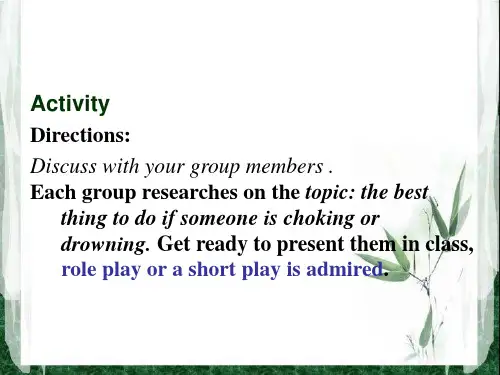
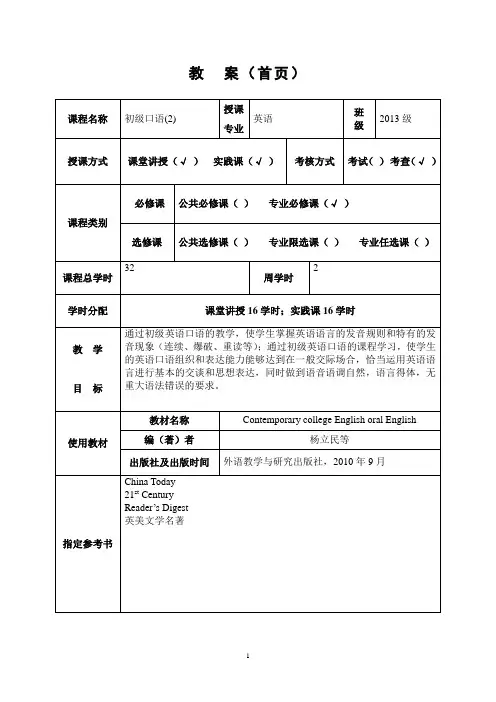
教案(首页)教案fortitude, unselfishness, etc.; the display of suchqualities.Heroism is the self-devotion of genius manifestingitself in action. --Hare.Syn: {Heroism}, {Courage}, {Fortitude}, {Bravery}, {Valor},{Intrepidity}, {Gallantry}.Usage: Courage is generic, denoting fearlessness or defianceof danger; fortitude is passive courage, the habit ofbearing up nobly under trials, danger, and sufferings;bravery is courage displayed in daring acts; valor iscourage in battle or other conflicts with livingopponents; intrepidity is firm courage, which shrinksnot amid the most appalling dangers; gallantry isadventurous courage, dashing into the thickest of thefight. Heroism may call into exercise all thesemodifications of courage. It is a contempt of danger,not from ignorance or inconsiderate levity, but from anoble devotion to some great cause, and a justconfidence of being able to meet danger in the spiritof such a cause. Cf. {Courage}.2.Divide the class into 5 groups with at least 5 ss. One of them acts as a host, the othersact as host to discuss the topic heroes and heroism.requirements:a.each group has a host who should keep the talk show be logical and also he or shecan have some opinion on what the others’ talk about;b.each member should have a profession, that is to say, their opinion on heroes andheroism should be put up within the field of profession.c.20min discussion.Teaching reflection: (教学反思: 由任课教师自己填写,重点说明本单元教学中存在的问题和改进意见)教案教案教学内容与组织安排Ⅰ. Time AllotmentWarming up 15’Text one 20’Expression learning 25’Talking about t he differences bwtween women and men 30’Comparing and contrasting 20’Group discussion and `presentation 55’International Women's Day 15’Ⅱ.Teaching Procedureⅰ. Warming Up 15’1. look at the following pictures and explain what they are about.The reacher will give students five minutes to discuss with their partners. Then they can have their own ideas about these pictures. Then they should think about the questions:①what is the most important thing to women for gaining equal position with men?②What should women do to enhance their social positon?ⅱ. Text one 20’First, the students will read the dialogues by themselves to talk about the family assiganment between women and men with the question whether they have equal division of work.Second, listen to the recording of the dialogues to correct their pronunciation and intonation.Third, the teacher will point the important language points:Phrases: by no meansdo the washing upnot reallybe responsible fornow thatsentence pattern: Who did what in your house?教案教案教案教案教案教案。
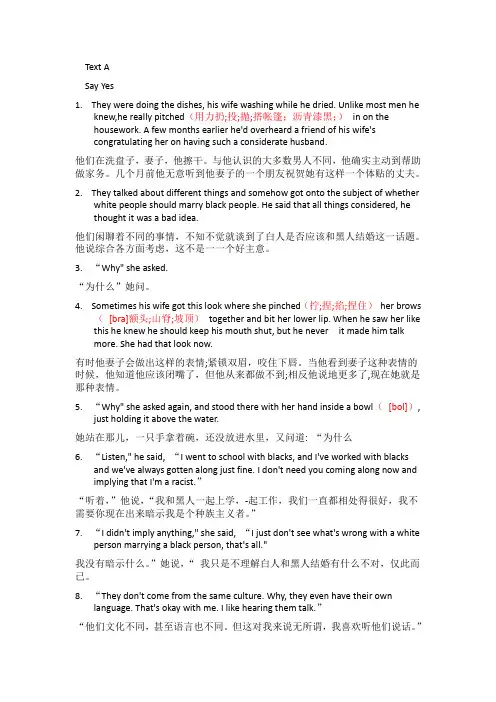
Text ASay Yes1.They were doing the dishes, his wife washing while he dried. Unlike most men heknew,he really pitched(用力扔;投;抛;搭帐篷;沥青漆黑;)in on thehousework. A few months earlier he'd overheard a friend of his wife'scongratulating her on having such a considerate husband.他们在洗盘子,妻子,他擦干。
与他认识的大多数男人不同,他确实主动到帮助做家务。
几个月前他无意听到他妻子的一个朋友祝贺她有这样一个体贴的丈夫。
2.They talked about different things and somehow got onto the subject of whetherwhite people should marry black people. He said that all things considered, he thought it was a bad idea.他们闲聊着不同的事情,不知不觉就谈到了白人是否应该和黑人结婚这一话题。
他说综合各方面考虑,这不是一一个好主意。
3.“Why" she asked.“为什么”她问。
4.Sometimes his wife got this look where she pinched(拧;捏;掐;捏住)her brows([bra]额头;山脊;坡顶)together and bit her lower lip. When he saw her like this he knew he should keep his mouth shut, but he never it made him talkmore. She had that look now.有时他妻子会做出这样的表情;紧锁双眉,咬住下唇。

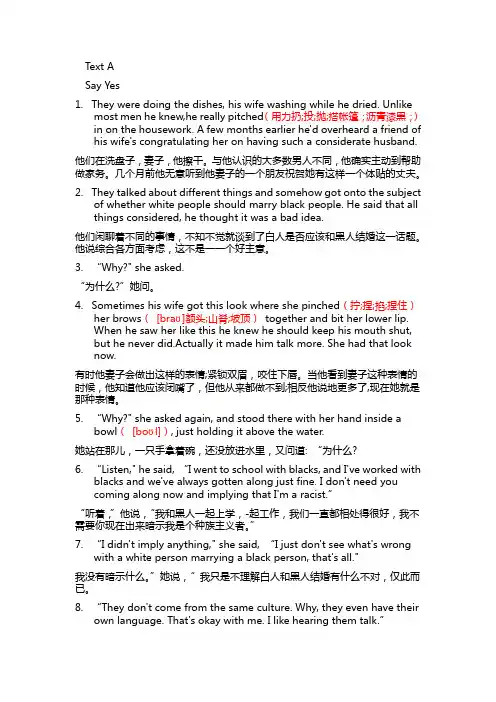
Text ASay Yes1.They were doing the dishes, his wife washing while he dried. Unlikemost men he knew,he really pitched(用力扔;投;抛;搭帐篷;沥青漆黑;)in on the housework. A few months earlier he'd overheard a friend of his wife's congratulating her on having such a considerate husband. 他们在洗盘子,妻子,他擦干。
与他认识的大多数男人不同,他确实主动到帮助做家务。
几个月前他无意听到他妻子的一个朋友祝贺她有这样一个体贴的丈夫。
2.They talked about different things and somehow got onto the subjectof whether white people should marry black people. He said that all things considered, he thought it was a bad idea.他们闲聊着不同的事情,不知不觉就谈到了白人是否应该和黑人结婚这一话题。
他说综合各方面考虑,这不是一一个好主意。
3.“Why?" she asked.“为什么?”她问。
4.Sometimes his wife got this look where she pinched(拧;捏;掐;捏住)her brows([braʊ]额头;山脊;坡顶)together and bit her lower lip.When he saw her like this he knew he should keep his mouth shut, but he never did.Actually it made him talk more. She had that look now.有时他妻子会做出这样的表情;紧锁双眉,咬住下唇。
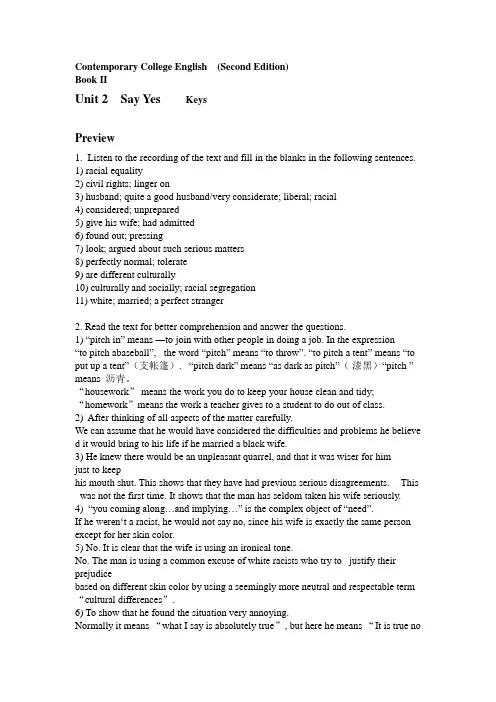
Contemporary College English (Second Edition)Book IIUnit 2 Say Yes KeysPreview1. Listen to the recording of the text and fill in the blanks in the following sentences.1) racial equality2) civil rights; linger on3) husband; quite a good husband/very considerate; liberal; racial4) considered; unprepared5) give his wife; had admitted6) found out; pressing7) look; argued about such serious matters8) perfectly normal; tolerate9) are different culturally10) culturally and socially; racial segregation11) white; married; a perfect stranger2. Read the text for better comprehension and answer the questions.1) “pitch in” means ―to join with other people in doing a job. In the expression “to pitch abaseball”, the word “pitch” means “to throw”. “to pitch a tent” means “to put up a tent”(支帐篷). “pitch dark” means “as dark as pitch”(漆黑)“pitch ” means 沥青。
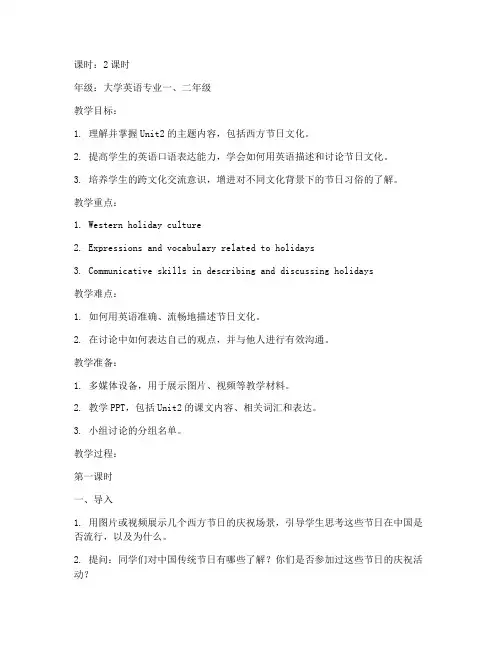
课时:2课时年级:大学英语专业一、二年级教学目标:1. 理解并掌握Unit2的主题内容,包括西方节日文化。
2. 提高学生的英语口语表达能力,学会如何用英语描述和讨论节日文化。
3. 培养学生的跨文化交流意识,增进对不同文化背景下的节日习俗的了解。
教学重点:1. Western holiday culture2. Expressions and vocabulary related to holidays3. Communicative skills in describing and discussing holidays教学难点:1. 如何用英语准确、流畅地描述节日文化。
2. 在讨论中如何表达自己的观点,并与他人进行有效沟通。
教学准备:1. 多媒体设备,用于展示图片、视频等教学材料。
2. 教学PPT,包括Unit2的课文内容、相关词汇和表达。
3. 小组讨论的分组名单。
教学过程:第一课时一、导入1. 用图片或视频展示几个西方节日的庆祝场景,引导学生思考这些节日在中国是否流行,以及为什么。
2. 提问:同学们对中国传统节日有哪些了解?你们是否参加过这些节日的庆祝活动?二、课文学习1. 学生阅读Unit2课文,了解西方节日的起源、庆祝方式和习俗。
2. 教师讲解课文中的重点词汇和表达,如:holiday、festival、custom、origin 等。
3. 学生跟读课文,模仿正确的发音和语调。
三、小组讨论1. 将学生分成小组,每组讨论一个西方节日,如:Christmas、Easter、Thanksgiving等。
2. 每组用英语描述所讨论的节日,包括起源、庆祝方式和习俗。
3. 小组代表向全班汇报讨论结果。
第二课时一、复习1. 回顾Unit2课文中的重点词汇和表达,巩固学生的记忆。
2. 让学生用所学的词汇和表达描述一个自己熟悉的节日。
二、角色扮演1. 教师提前准备几个与节日相关的场景,如:圣诞购物、万圣节派对等。
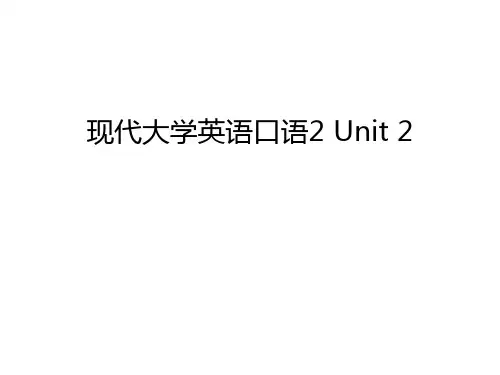
现代大学英语第二册第二课S a y Y e s单元测试U n i t2-CAL-FENGHAI-(2020YEAR-YICAI)_JINGBIANBook 2 Unit 2 Say YesI. Spell out the words according to the definitions given. The initial letters are given as a clue.1. a ______to understand or realize that sth. is true2. c ______ a feeling of worry esp. one that is shared by many people3. c ______ thoughtful of the rights or feelings of others4. c ______ to get a person or an animal into a place or situation from which theycan’t escape5. d ______ to discuss sth. formally, before making a decision or finding a solution6. d ______ to show clearly7.g ______ covered with oil or fat8.h ______ pretending to have moral standards or opinions that they do notactually have9.i ______ to suggest that sth. is true without saying this directly10.i ______ lack of interest or concern11.p ______to press tightly between finger and thumb12.p ______ to beat quickly and loudly13.r ______ a person who believes that people of his own race are better thanothers14.r ______ to turn things over and look into all the corners while trying to find sth.15.s ______ to say angrily; to move suddenly16.s ______ to press firmly inward or from the opposite side17.s ______ a collection of information shown in numbers18.t ______ very large, very great19.t ______ completely20.u ______ not married or engaged; still singleKeys: 1. appreciate 2. concern 3. considerate 4. corner 5. debate6. demonstrate7. greasy8. hypocritical9. imply 10. indifference11. pinch 12. pound 13. racist 14. rummage 15. snap16. squeeze 17. statistics 18. terrific 19. thoroughly 20. unattachedII. Complete the sentences, using the proper forms of the expressions chosen1.Unlike most men he knew, he really _____ on the housework.2.They talked about different things and somehow ____ of whether white peopleshould marry black people.3.Oh boy, he thought. He said, “Don’t _____ . Look at the statistics. Most of thosemarriages break up.4.“Yes, different,” he snapped, angry with her for _____ this trick of repeating hiswords so that they sounded hypocritical.5.When he came back down she was ______ the refrigerator with her eyes closed,still holding her hand.6.He took her hand and _________ her thumb with the cotton. The bleeding had stopped.7.He hoped that she appreciated how quickly he had ________ .8.He’d acted _______ concern for her, he thought it would be a nice gesture on her part not tostart up that conversation again, as he was tired of it.9.He knew that she was too angry to be actually reading it, but she didn’t _____the way he would have done.10.While he was at it, he decided, he _______ mop the floor.11.The night was clear and he could see a few stars to the west, where the lights ofthe town didn’t ____________.12.He felt ashamed that he had let his wife _______. In another thirty years or sothey would both be dead.13.“Ann, I’m really sorry,” he said. I’ll _______. I promise.”14.He knew that he had to _______ the right answer.15.He _______ and pulled the chain on the bedside lamp. The room was dark. Keys: 1. pitched in 2. got onto the subject 3. take my word for it4. resorting to5. leaning against6. dabbed at7. come to her aid 8. out of 9. snap through the pages10. might as well 11. blur them out 12. get him into a fight13. make it up to you 14. come up with 15. reached overIII. Translation:1. 我年轻时,人们就是这样生活的。
教案(首页)教案fortitude, unselfishness, etc.; the display of suchqualities.Heroism is the self-devotion of genius manifestingitself in action. --Hare.Syn: {Heroism}, {Courage}, {Fortitude}, {Bravery}, {Valor},{Intrepidity}, {Gallantry}.Usage: Courage is generic, denoting fearlessness or defianceof danger; fortitude is passive courage, the habit ofbearing up nobly under trials, danger, and sufferings;bravery is courage displayed in daring acts; valor iscourage in battle or other conflicts with livingopponents; intrepidity is firm courage, which shrinksnot amid the most appalling dangers; gallantry isadventurous courage, dashing into the thickest of thefight. Heroism may call into exercise all thesemodifications of courage. It is a contempt of danger,not from ignorance or inconsiderate levity, but from anoble devotion to some great cause, and a justconfidence of being able to meet danger in the spiritof such a cause. Cf. {Courage}.2.Divide the class into 5 groups with at least 5 ss. One of them acts as a host, the othersact as host to discuss the topic heroes and heroism.requirements:a.each group has a host who should keep the talk show be logical and also he or shecan have some opinion on what the others’ talk about;b.each member should have a profession, that is to say, their opinion on heroes andheroism should be put up within the field of profession.c.20min discussion.Teaching reflection: (教学反思: 由任课教师自己填写,重点说明本单元教学中存在的问题和改进意见)教案教案教学内容与组织安排Ⅰ. Time AllotmentWarming up 15’Text one 20’Expression learning 25’Talking about t he differences bwtween women and men 30’Comparing and contrasting 20’Group discussion and `presentation 55’International Women's Day 15’Ⅱ.Teaching Procedureⅰ. Warming Up 15’1. look at the following pictures and explain what they are about.The reacher will give students five minutes to discuss with their partners. Then they can have their own ideas about these pictures. Then they should think about the questions:①what is the most important thing to women for gaining equal position with men?②What should women do to enhance their social positon?ⅱ. Text one 20’First, the students will read the dialogues by themselves to talk about the family assiganment between women and men with the question whether they have equal division of work.Second, listen to the recording of the dialogues to correct their pronunciation and intonation.Third, the teacher will point the important language points:Phrases: by no meansdo the washing upnot reallybe responsible fornow thatsentence pattern: Who did what in your house?教案教案教案教案教案教案。
Text ASay Yes1.They were doing the dishes, his wife washing while he dried. Unlikemost men he knew,he really pitched(用力扔;投;抛;搭帐篷;沥青漆黑;)in on the housework. A few months earlier he'd overheard a friend of his wife's congratulating her on having such a considerate husband. 他们在洗盘子,妻子,他擦干。
与他认识的大多数男人不同,他确实主动到帮助做家务。
几个月前他无意听到他妻子的一个朋友祝贺她有这样一个体贴的丈夫。
2.They talked about different things and somehow got onto the subjectof whether white people should marry black people. He said that all things considered, he thought it was a bad idea.他们闲聊着不同的事情,不知不觉就谈到了白人是否应该和黑人结婚这一话题。
他说综合各方面考虑,这不是一一个好主意。
3.“Why?" she asked.“为什么?”她问。
4.Sometimes his wife got this look where she pinched(拧;捏;掐;捏住)her brows([braʊ]额头;山脊;坡顶)together and bit her lower lip.When he saw her like this he knew he should keep his mouth shut, but he never did.Actually it made him talk more. She had that look now.有时他妻子会做出这样的表情;紧锁双眉,咬住下唇。